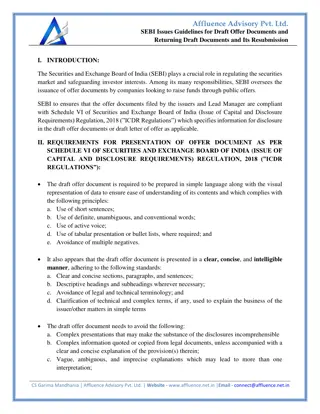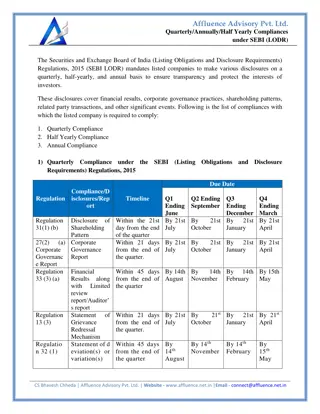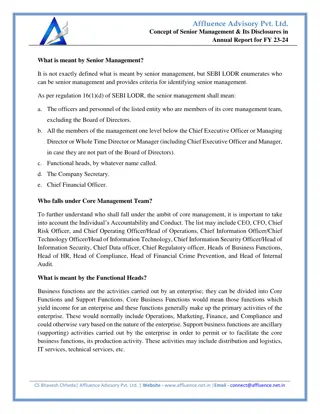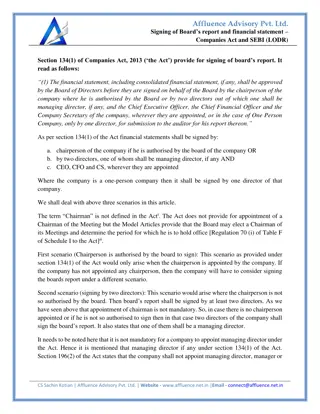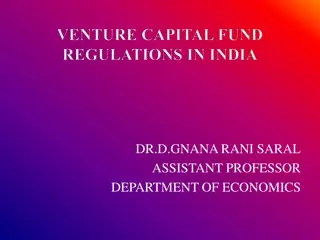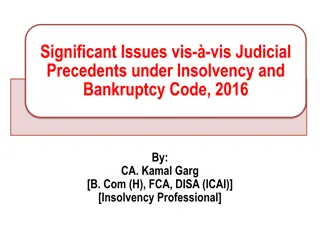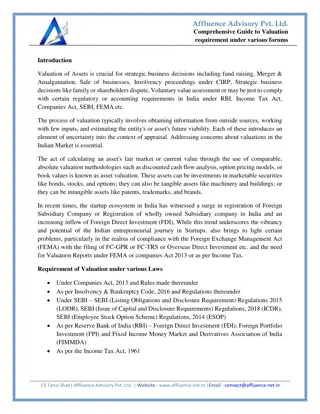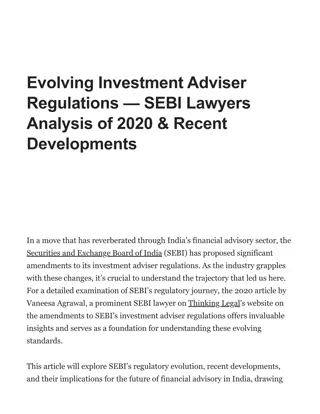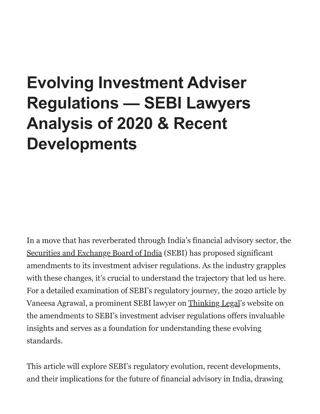Functions of SEBI: Protective, Regulatory, Development
SEBI, the Securities and Exchange Board of India, performs various functions to protect investors, regulate the market, and promote development. Its protective function includes prohibiting insider trading and price rigging, and promoting fair practices. Its regulatory function involves establishing
7 views • 5 slides
Understanding the Role and Qualifications of Independent Directors in Company Governance
Independent directors play a crucial role in corporate governance by providing unbiased oversight and strategic guidance. They are required to meet specific qualifications and criteria as per the Companies Act and SEBI regulations. The process of defining, appointing, and functioning of independent
0 views • 20 slides
SEBI Issues Guidelines for Draft Offer Documents and Returning Draft Documents
SEBI plays a crucial role in regulating the securities market and safeguarding investor interests. Among its many responsibilities, SEBI oversees the issuance of offer documents by companies looking to raise funds through public offers.\n\nSEBI to ensures that the offer documents filed by the issuer
6 views • 4 slides
Quarterly-Annually-Half Yearly Compliances under SEBI LODR
The SEBI (Listing Obligations and Disclosure Requirements) Regulations 2015 mandate that listed companies must adhere to a strict schedule of disclosures on a quarterly, half-yearly, and annual basis. These requirements include financial results, corporate governance reports, shareholding patterns,
0 views • 4 slides
Concept of Senior Management & Its Disclosures in Annual Reports
The document outlines the definitions, roles, and disclosure requirements for senior management under SEBI LODR regulations in the annual report for FY 2023-24. Senior management includes core management team members below the CEO\/MD, functional heads, CFO, and Company Secretary. Key updates includ
0 views • 4 slides
SEBI's Role in Investor Protection and Stock Market Regulation
Securities and Exchange Board of India (SEBI) plays a crucial role in safeguarding investor interests and ensuring fair practices in the Indian stock market. By promoting transparency, enforcing regulations, and regulating market intermediaries, SEBI aims to maintain market integrity, protect invest
0 views • 23 slides
Foreign Investments in India: Legal Framework and Investment Routes
Key statutes applicable for foreign investors in India include FEMA, SEBI regulations, and legislations governing securities markets. Foreign investments avenues in India include FDI, FVCI, FPI, NRI investments through SEBI approval or automatic approval route. Foreign Portfolio Investors (FPIs) and
1 views • 54 slides
Signing of Board’s report and financial statement – Companies Act and SEBI
Section 134(1) of the Companies Act, 2013 outlines specific guidelines for signing a board's report. This article delves into the various scenarios based on company structure, ensuring you understand who is required to sign. Stay informed and complia
0 views • 4 slides
Overview of Indian Securities Market and SEBI
Explore the Indian Securities Market and the role of SEBI in regulating it. Learn about key concepts such as primary and secondary markets, investor rights, mutual funds, and investor grievance redressal. Understand the structure of the market and the prerequisites for buying and selling shares. Dis
0 views • 56 slides
Insights into India's Venture Capital Industry Growth and Potential
Explore the growth and challenges of the Indian Venture Capital industry, including the role of SEBI regulations, investment routes, organization structures for VCFs, and the country's potential in commercializing research and scientific knowledge. Discover the significant increase in registered Ven
0 views • 25 slides
Guidelines and Regulations for Mutual Fund Investments in India
SEBI, the regulatory authority in India, aims to protect investors by simplifying mutual fund schemes and promoting transparency. Guidelines cover structure, categorization, and investment regulations for equity, debt, balanced, and solution-oriented funds.
0 views • 19 slides
Analysis of Manipulated Penny Stocks and SEBI Investigation
Detailed analysis of manipulated penny stocks through day-wise share price data and graph verification in Excel. SEBI's interim order against First Financial Services Ltd for market manipulation and misuse of funds. Investigation revealing misuse of preferential allotment funds leading to a substant
0 views • 12 slides
Key Judicial Precedents on Insolvency and Bankruptcy Code, 2016
Key judicial precedents under the Insolvency and Bankruptcy Code, 2016 are discussed, including rulings on insolvency pleas, distribution of profits during Corporate Insolvency Resolution Process (CIRP), obligations of unrelated parties, the 90-day period for filing claims, and the interaction of mo
1 views • 21 slides
Comprehensive Guide to Valuation requirement under various forum
Explore our comprehensive guide on asset valuation in India, covering essential compliance with RBI, SEBI, FEMA, and Companies Act regulations. Learn about best practices, DCF method, and critical documentation needed for strategic business decisions
0 views • 3 slides
The Hindenburg Case A Lesson in Communication & the Need for SEBI Lawyers
The world of financial markets thrives on information. Investor decisions, market trends, and ultimately, a healthy economic ecosystem rely on accurate and timely communication from companies
0 views • 6 slides
Understanding Related Party Transactions in Corporate Governance
Related Party Transactions (RPT) are vital in today's business world, ensuring transparency and disclosure in transactions involving parties related to the company. This article explores the significance of RPT, definitions under CA 2013 and SEBI LODR 2015, as well as the identification criteria as
0 views • 30 slides
Client Code Modification and Tax Evasion: Regulatory Issues in Stock Exchanges
Client Code Modification (CCM) is a service provided by Stock Exchanges to rectify errors in client codes during trading hours, but it has been misused for tax evasion by some brokers. Investigations revealed significant modifications leading to tax evasion. Regulatory bodies like SEBI and CBDT have
0 views • 41 slides
Enhancing Security and Covenant Monitoring with DLT - Catalyst Trusteeship Limited
SEBI's circular on security creation and covenant monitoring for Non-Convertible Securities (NCS) aims to improve processes through Distributed Ledger Technology (DLT). The circular covers crucial aspects such as asset cover, charge creation, covenant monitoring, and more, applicable from 01.04.2022
0 views • 16 slides
Overview of the Securities and Exchange Board of India (SEBI)
The Securities and Exchange Board of India (SEBI) was established in 1992 to regulate and promote the development of the securities market. SEBI aims to protect investor interests, prevent malpractices, and ensure a fair and transparent market. Through its objectives, SEBI plays a crucial role in re
0 views • 5 slides
Evolving Investment Adviser Regulations — SEBI Lawyers Analysis of 2020 & Recent
Vaneesa Agrawal, an expert SEBI lawyer highlights that these regulations were designed to ensure transparency, mitigate conflicts of interest, and safeguard client interests by setting clear guidelines for who could provide investment advice and unde
0 views • 6 slides
Evolving Investment Adviser Regulations - SEBI Lawyers Analysis of 2020 & Recent Developments
In a move that has reverberated through India\u2019s financial advisory sector, the Securities and Exchange Board of India (SEBI) has proposed significant amendments to its investment adviser regulations
0 views • 6 slides
Role and Functions of SEBI in Financial Market Regulation
SEBI, the Securities and Exchange Board of India, plays a crucial role in protecting investor interests and ensuring fair practices in the financial market. It carries out protective functions by preventing insider trading and price rigging, promotes fair trade practices, and provides financial educ
0 views • 5 slides
The Role and Purpose of Securities and Exchange Board of India (SEBI)
Established in 1988 by the Government of India, Securities and Exchange Board of India (SEBI) plays a crucial role in regulating the securities market. SEBI aims to promote investor protection, ensure fair practices, and facilitate efficient resource mobilization. By monitoring and enforcing regulat
0 views • 15 slides
Understanding Venture Capital: Key Concepts and Regulations
Venture capital is a form of financing provided to startup companies with high growth potential. It involves high risk and requires a long-term horizon, often coming in various forms like equity, conditional loans, and participation in management. The process includes stages such as seed capital, ex
0 views • 10 slides
Overview of Corporate Legislation in India for Societal Welfare
The Government of India has enacted various legislations to safeguard societal interests and ensure the benefits of industrialization are enjoyed by all. Corporate entities adhere to these laws for societal well-being, with key acts such as the Companies Act, 1956, and the Securities and Exchange Bo
0 views • 15 slides
Sarsaparilla Dr Sebi | Leafoflifeherbs.com
Sarsaparilla root is one of the top herbal remedies recommended by Dr. Sebi. This powerful herb has a long history of use for a variety of health conditions. Explore Leafoflifeherbs.com for further information.
3 views • 1 slides


